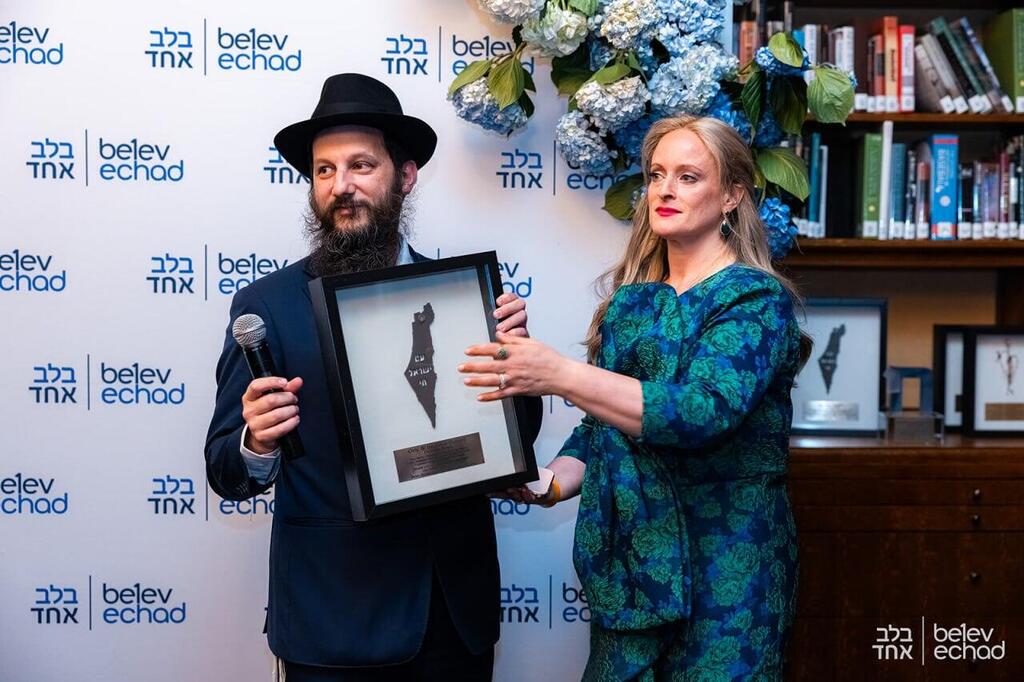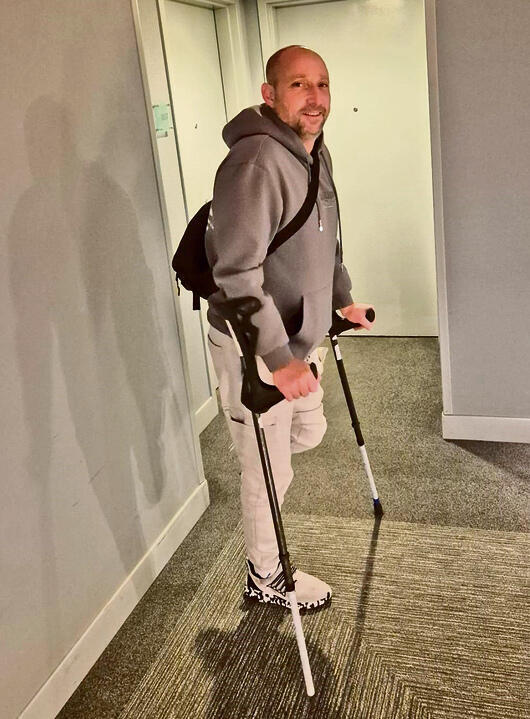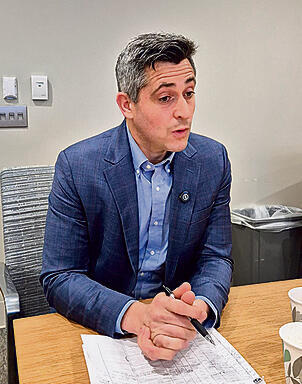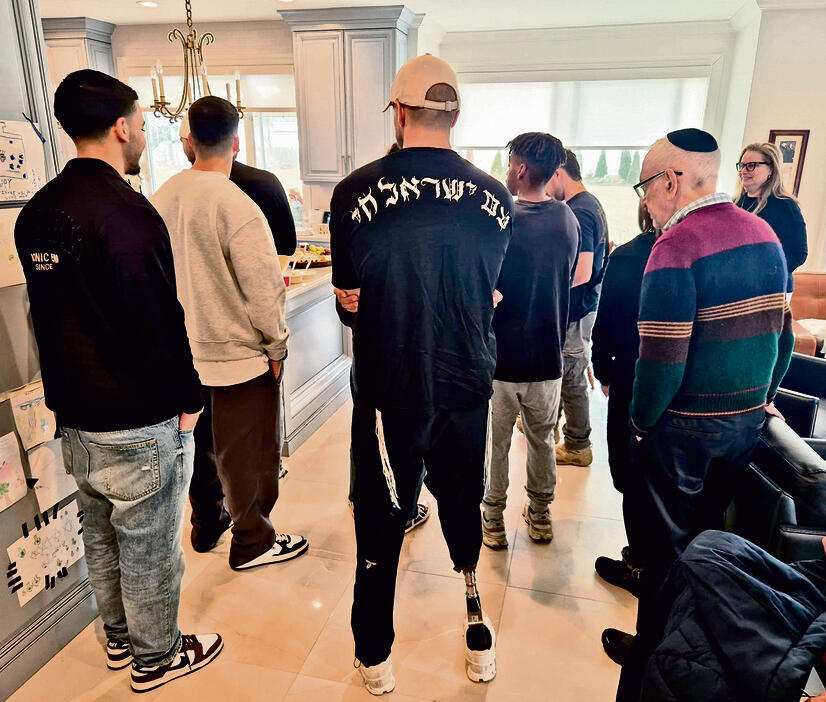Getting your Trinity Audio player ready...
From their home in Manhattan, Rabbi Uriel and Rebbetzin Shevy Vigler lead a life-changing mission. As founders of Belev Echad—Hebrew for "With One Heart"—they dedicate their days to supporting wounded and disabled IDF soldiers and veterans.
Since October 7, the need has grown exponentially, and Rabbi Vigler found a powerful partner in Dr. Omri Ayalon, a senior orthopedic surgeon at NYU and a global expert in amputation rehabilitation. Together, they are not just saving lives—they are restoring them.
Dr. Omri Ayalon, 41, head of the Amputation Reconstruction Center at NYU, is the son of Israeli immigrants who moved to the U.S. in 1979. After the horrific events of October 7, he felt a deep responsibility to help. He reached out to Rabbi Vigler and soon began treating dozens of wounded Israeli soldiers—performing complex surgeries, fitting advanced prosthetics and overseeing their physical therapy. “Meeting these young people who gave everything to defend their country is incredibly humbling,” Ayalon says. “My role is to give them the very best care medicine can offer.”
Through Belev Echad, wounded IDF soldiers are flown to New York for comprehensive medical treatment. Each receives an evaluation by a multidisciplinary team—pain specialists, physiotherapists, prosthetic experts and more. Many arrive suffering from phantom pain or difficulty adapting to prosthetics provided in Israel.
'They gave me my soul back'
Among the most powerful stories is that of Roee Sal, a Golani Brigade fighter injured back in 2000. After two decades of chronic pain, he underwent a leg amputation five years ago—but the pain didn’t stop. Then came Belev Echad. Although his injury preceded the current war, the organization stepped in. Dr. Ayalon performed an innovative surgery that changed Roee’s life.
“My dream was to run again,” Roee shares. Not only did he receive a running prosthesis and pain-eliminating surgery—Belev Echad covered his entire stay in New York, including surprises like NBA game tickets. “They gave me my soul back,” Roee says. “They returned to me something the Defense Ministry took away. They’re a group of angels.”
Dr. Ayalon utilizes cutting-edge nerve surgeries and state-of-the-art prosthetics to improve the quality of life for his patients. “In war, doctors often focus on saving lives—but we focus on living well,” he explains. “With Rabbi Vigler, I have the privilege of helping restore quality of life.”
Rabbi Vigler, a Chabad emissary, describes his connection with Ayalon as a divine partnership. “He brings doctors together to build custom care teams for each soldier. There’s vast expertise in the U.S. when it comes to treating amputees.”
A growing army of donors
Founded in 2010, Belev Echad has supported thousands of wounded soldiers in a variety of ways. During the COVID-19 pandemic, it opened a healing villa in Kiryat Ono. Since October 7 alone, Belev Echad has cared for more than 2,000 soldiers—triple the number from all previous years combined. Yet the organization receives no government funding. “We rely entirely on donations from Jews and Israelis around the world,” says Rabbi Vigler. “We have an army of donors.”
Each New York delegation includes severely wounded soldiers, accompanied by those more lightly injured. Bonds are quickly formed—"closer than blood," says Vigler. “At night, the pain doesn’t discriminate. Everyone cries out. Everyone is hurting. Everyone is traumatized.”
One of the most tragic stories is that of Raz Mizrahi, who was injured in a car-ramming attack in 2021. She was a beloved part of Belev Echad and visited New York with one of its delegations. In September 2023, she returned—but a month later, she was murdered at the Nova music festival.
Avi, a Kfir Brigade career soldier wounded in Gaza, says, “The trip to New York was better than any treatment I’ve received.” Yuval, injured at the Nahal Oz command center, adds, “We share our stories. It helps us cope. We support and understand each other.”
Rabbi Vigler: 'The soldiers’ stories move people. The community feels their pain. Tens of thousands of Americans have donated—from small amounts to gifts in the seven-figure range. Belev Echad is a bridge.'
Dr. Ayalon praises Israel’s medical professionals. “The level of trauma care in Israel is among the best in the world. What they did was heroic and should be acknowledged globally.” Still, his clinic offers unique experience in rehabilitation and amputation recovery, built over years of specialized work.
Was there any opposition in New York to treating Israeli soldiers?
“In surgery, you treat people, not politics,” Ayalon responds. “Our staff welcomed the soldiers warmly. People here want to know them, to see how they heal. Medicine transcends politics.”
Rabbi Vigler has flown Israeli doctors to New York to learn these advanced techniques, and Dr. Ayalon plans to visit Israel to lead workshops. Vigler emphasizes the broader goal: connecting wounded soldiers with Jewish and Israeli communities in the U.S.—and inspiring global support. “The soldiers’ stories move people. The community feels their pain. Tens of thousands of Americans have donated—from small amounts to gifts in the seven-figure range. Belev Echad is a bridge.”
One story stands out: a soldier, part of Israel’s security forces, was ambushed in Kfar Aza on October 7. Shot by a Hamas sniper, he lay on the ground, reciting the Shema prayer and saying goodbye to his wife and children. He lost consciousness for 45 minutes. When he awoke, he was hit again. His body was filled with shrapnel. “I’ve never seen someone in such pain,” says Vigler. “He went through a grueling surgery in New York and came back to life. Now, he’s climbing mountains.”
The organization currently has a waiting list of 250 soldiers. “Our teams visit hospitals every day, encouraging the wounded,” says Rabbi Vigler. “The need is overwhelming. We dream of expanding, of building a second facility. Our annual budget is $15 million.”
Get the Ynetnews app on your smartphone: Google Play: https://bit.ly/4eJ37pE | Apple App Store: https://bit.ly/3ZL7iNv
In one particularly moving case, a soldier treated by Belev Echad asked for help to marry his fiancée—and even donated $1,800 to the organization himself. “It was full circle,” says Vigler. “We helped him. And he gave back.”
Some soldiers have even met and married American Jewish women through the program. “We’ve already had a few matches,” he smiles.
Still, Rabbi Vigler adds, the ultimate goal is to shut Belev Echad down. “I’m not joking. We pray for the day when our help won’t be needed anymore.”






